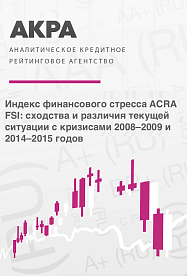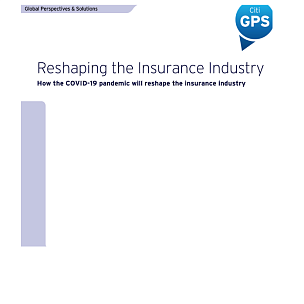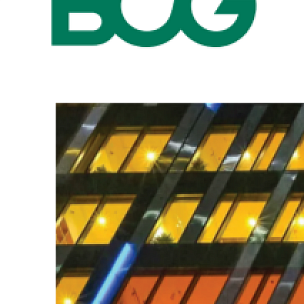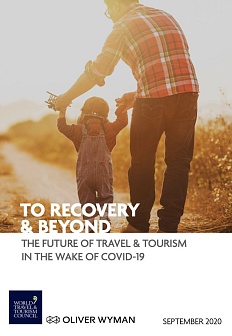In this publication, the Analytical Credit Rating Agency (ACRA) studies dynamics of its financial stress index ACRA FSI. Analysts draw parallels between the current situation and the crises of 20082009 and 20142015. They note that the impact of the current situation on the global financial market is somewhat similar to what was observed before. They point to some positive trends, namely that huge gaps in payment chains in the real economy and the high volatility of prices for key commodities have not yet led to banking sector crises. The significantly smaller increase in the asymmetry of information about the quality of assets or borrowers distinguishes the current situation from previous crises. In particular, the spread between the interbank market rates and the Bank of Russias liquidity provision rates, as well as the average variation of yield on stocks and bonds of financial institutions differ for the better compared to past crises.
The Roscongress Foundation presents the salient points of the publication accompanied by fragments of broadcasts of relevant panel discussions from the business programme of international events held by the Roscongress Foundation.
Compared to previous crises, the colossal crisis triggered by the COVID-19 pandemic shows both similarities and differences.
ACRA analysts note that the starts of the largest crises of the 21st century, both financial and economic, were preceded either by financial market problems (the global financial crisis), or other structural economic problems (the European debt crisis). In this regard, the 2020 crisis, which has been triggered by the COVID-19 pandemic, is unprecedented.
At the same time, the impact of the current situation on the global financial market is somewhat similar to what was observed in 20072009. During periods of crisis phenomena, investors generally prefer high-quality («flight to quality») and/or highly liquid («flight to liquidity») assets. Today, like during the global financial crisis, yields on sovereign bonds with high credit ratings are declining, demand for cash and hard currency is increasing, stock exchange indices are falling, and gold is appreciating. In addition, investors are discarding higher risk securities of developing economies in favor of lower risk securities of developed economies.
At this stage, the key difference between the current crisis and the global crisis of 20072009 is that huge gaps in payment chains in the real economy and the high volatility of prices for key commodities have not yet led to banking sector crises. An important difference is also the generally more sustainable financial standing of the global banking system due to a significant increase in capitalization and regulatory limitations that prevent banks from taking on big risks.
Banks are currently not experiencing a liquidity crisis. It is worth mentioning that governments are actively supporting citizens and companies amid quarantine conditions and production shutdowns.
Due to the COVID-19 crisis, economic activity in Russia is declining while financial market instability and commodity price volatility are contributing to an increasing level of financial stress. A similar situation is unfolding in many other countries.
The current situation in Russia is very similar to what is happening in many other countries, for example, the United States: economic activity is declining while financial market instability and commodity price volatility are contributing to an increasing level of financial stress.
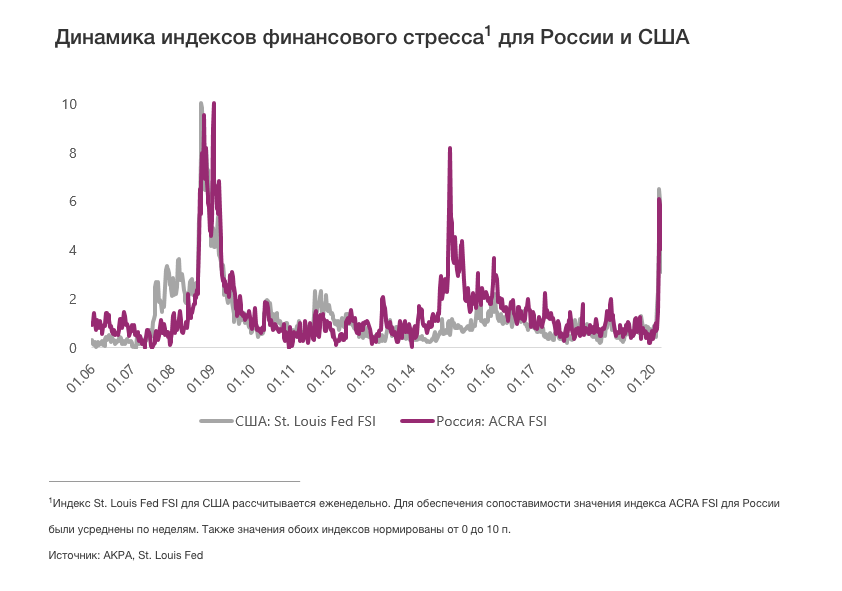
However, the level of financial stress in both countries is currently lower than the values recorded in 20082009, which is mainly due to the absence of banking crises.
The publication provides dynamics of the ACRA FSI (Financial Stress Index) calculated by ACRA on a daily basis in order to assess how close the Russian financial system is to a crisis. The index exceeded the critical mark of 2.5 points on March 9 this year. As a rule, this indicates the increased likelihood of the onset of a financial crisis (hereinafter, the moment of crossing this boundary [2.5 points] is regarded as the beginning of a financial crisis). In addition, an increase in the index is often followed by problems in the real sector of the economy.
On April 20, the ACRA FSI fell to slightly below 2.5 points. However, it is still too early to say that the situation has stabilized.
The moment a liquidity deficit in the banking sector reaches its peak usually coincides with the crisis in the countrys financial system entering the acute phase. There were 135 days between the start of the 20082009 crisis (when the ACRA FSI crossed the 2.5 point boundary) and the beginning of its acute phase, while in 2014, there were only 15 days between these two events. In this respect, financial stress developed a lot more rapidly in 20142015.
The way the 2020 crisis is currently developing is more similar to the situation that unfolded in 20082009. Bank borrowers main solvency problems may arise after the tough quarantine measures are lifted. The strengthening of major banks financial indicators over the past few years and the experience garnered by the Bank of Russia in responding to banking sector crises when necessary may considerably improve the liquidity situation in the banking sector compared to previous crises. Nevertheless, ACRA analysts believe that the peak of financial stress may still be yet to come.
Video: https://roscongress.org/sessions/biznes-v-poiskakh-doveriya/search/#00:15:27.743
For more information about possible ways to stabilize the economy during a pandemic, please see the StayHomeEconomy special section of the Roscongress information and analytical system, and the Financial market and Monetary policy sections about various aspects of monetary policy and financial market development opportunities.


